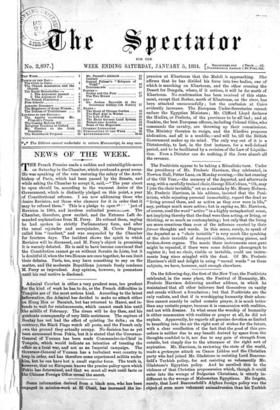The Positivists appear to be taking a Ritualistic turn. Under
the presidency of Mr. Frederic Harrison, they celebrated, in Newton Hall, Fetter Lane, on Monday evening,—the last evening of the Old Year,—the memory of the departed, and afterwards sang, with a carefully trained choir, George Eliot's lines, "Oh, may I join the choir invisible," set as a cantata by Mr. Henry Holmes. Mr. Frederic Harrison, in his address, insisted that the Posi- tivists, while rejecting persona] immortality, regard the dead as " living around them, and as active as they ever were in life," nay, perhaps much more active ; but in saying so, Mr. Harrison, of course, used the word" active " in a highly metaphorical sense, not implying thereby that the dead were then acting, or living, or thinking, or so much as contemplating ; but only that the living are more conscious than ever of the influence exerted by their former thoughts and words. In this sense, surely, to speak of the departed as a "choir invisible" is very much like speaking of the choir invisible of decayed violins, unstrung pianos, and broken-down organs. The music these instruments once gave might be repeated, if there were some delicate phonograph to register it; but no choir, visible or invisible, could use instru- ments long since mingled with the dust. Of Mr. Frederic Harrison's skill and delight in using " unreal words " on these subjects, we have, however, said enough elsewhere.






































